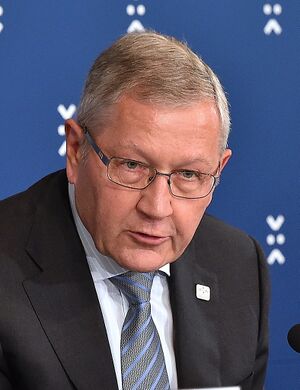Klaus Regling
( financier, central banker) | |
|---|---|
 | |
| Born | 3 October 1950 Lübeck, West Germany |
| Nationality | German |
| Alma mater | • University of Hamburg • University of Regensburg |
| Member of | Atlantik-Brücke, WEF/Global Leaders for Tomorrow/1993 |
Chief Executive Officer of the European Financial Stability Facility and Managing Director of the European Stability Mechanism. Considered as a possible head of the European Central Bank | |
Klaus P. Regling is a German economist and current Chief Executive Officer of the European Financial Stability Facility (EFSF)[1] and Managing Director of the European Stability Mechanism.[2] Regling, who has a revolving door to the financial industry and hedge funds, was reportedly considered as a possible head of the European Central Bank to succeed Jean Claude Trichet.[3]
He was selected a Global Leader for Tomorrow by the World Economic Forum in 1993. He is a member of the transatlantic deep state network Atlantik-Brücke.
Contents
Background
The son of a carpenter who sat in the German Bundestag for the Social Democrats,[4] Regling studied economics at the University of Hamburg, and after receiving his bachelor's degree in 1971 went on to the University of Regensburg, where he earned a master's in the subject in 1975.
Career
In 1975 Regling began work at the International Monetary Fund (IMF) in Washington, D.C.. He spent his first two years as part of the IMF's Economist Program, specifically the Research and African Department, and the following three years as an economist in the Research Department.[5]
In 1980 Regling left and spent a year in the Economics Department of the Association of German Banks (BdB) before being hired as an economist by the German Ministry of Finance, where he worked in the European Monetary Affairs Division until 1985. That year he returned to the IMF and worked both in Washington as well as in Jakarta, Indonesia. In 1991 Regling left the IMF once again and returned to the German Ministry of Finance, where he was named the Chief of the International Monetary Affairs Division. In 1993 he became the Deputy Director-General for International Monetary and Financial Relations and in 1995 the Director-General for European and International Financial Relations. In this capacity, he was Chancellor Helmut Kohl’s representative to the IMF and the Group of Seven industrialized nations.[6] While at the Ministry, he also held the roles of an alternate governor to the Asian Development Bank and the Inter-American Development Bank as well as on the supervisory board of Hermes Credit Insurance.[7] He remained with the ministry until 1998.
In 1998, Regling left the Treasury Department for the financial industry. He spent two years in the private sector as managing director of the hedge fund Moore Capital Strategy Group[8]. The return to the political sector took place in 2001 when he moved to the European Commission and took office as Director General for Economics and Monetary Affairs.[9], where he and remained till June 2008.
From 2008 to March 2009 he was part of the Issing Commission, which was formed by Chancellor Angela Merkel to advise the government on financial regulatory reform. The commission was dominated by "permanent players in the financial market system".[10] He also became chairman of the Brussels-based KR Economics consultancy.[11]
He also was a professor at the Lee Kuan Yew School of Public Policy in Singapore for one year[12] During this time he made contact with Asian financial investors. The fact that Asian investors have each subscribed to around 40 percent of the shares issued by the EFSF could give scope for further critical speculation.[13]
From New Year's until mid-June 2010, Regling was a director of the hedge fund Winton Futures Fund Ltd.[14]
European Financial Stability Facility
On July 1, 2010 he became head of the European Financial Stability Facility.[15]
In the dispute over EU bonds in early 2011, he was close to Luxembourg Prime Minister Jean-Claude Juncker.[16]
In a 2013 interview 2013, he advocated for in the long term abolishing the “troika” of the International Monetary Fund (IMF), the European Central Bank (ECB) and the EU Commission in providing crisis aid for euro countries in need. In the short and medium term, the IMF should stay on board because it has the most experience with aid programs. In the long run, the euro states would have to manage such programs themselves. He sharply criticized the IMF for its assessment of the previous aid to Greece: “The IMF ridicules the stability pact and declares itself responsible for creating growth. In doing so, it not only creates a false contrast. Above all, it shows that he does not understand the rules of our monetary union."[17]
Events Participated in
| Event | Start | End | Location(s) | Description |
|---|---|---|---|---|
| WEF/Annual Meeting/2013 | 23 January 2013 | 27 January 2013 | Switzerland WEF | 2500 mostly unelected leaders met to discuss "leading through adversity" |
| WEF/Annual Meeting/2020 | 21 January 2020 | 24 January 2020 | Switzerland WEF | This mega-summit of the world's ruling class and their political and media appendages happens every year, but 2020 was special, as the continuous corporate media coverage of COVID-19 started more or less from one day to the next on 20/21 January 2020, coinciding with the start of the meeting. |
| WEF/Annual Meeting/2022 | 22 May 2022 | 26 May 2022 | Switzerland WEF | 1911 guests in Davos |
References
- ↑ http://www.efsf.europa.eu/attachments/cv_klaus_regling_en.pdf
- ↑ http://www.esm.europa.eu/about/organisation/index.htm
- ↑ https://www.nytimes.com/2011/02/12/business/global/12ecb.html?scp=1&sq=klaus%20regling&st=cse
- ↑ Zeke Turner (August 21, 2015), Meet Mr. Stability Politico Europe.
- ↑ http://www.oecd.org/dataoecd/23/38/40685241.pdf
- ↑ Klaus Regling: Money meister European Voice, May 30, 2001.
- ↑ Klaus Regling: Money meister European Voice, May 30, 2001.
- ↑ https://web.archive.org/web/20151208063138/http://www.oecd.org/dataoecd/23/38/40685241.pdf
- ↑ http://www.zeit.de/2011/43/P-Regling/seite-2
- ↑ http://www.nachdenkseiten.de/?p=3842
- ↑ https://web.archive.org/web/20120310103020/http://www.bankinginquiry.gov.ie/Biographies.aspx
- ↑ http://www.faz.net/aktuell/wirtschaft/eurokrise/klaus-regling-der-uneitle-euro-krisenmanager-11113420.html
- ↑ http://www.faz.net/aktuell/wirtschaft/eurokrise/klaus-regling-der-uneitle-euro-krisenmanager-11113420.html
- ↑ http://investing.businessweek.com/businessweek/research/stocks/private/person.asp?personId=26202140&privcapId=108941&previousCapId=398625&previousTitle=GOLDMAN%20SACHS%20GROUP%20INC
- ↑ http://www.economist.com/node/1648560
- ↑ https://web.archive.org/web/20110102221625/http://www.fr-online.de/wirtschaft/der-euro-retter/-/1472780/5052618/-/index.html
- ↑ http://www.faz.net/aktuell/wirtschaft/europas-schuldenkrise/klaus-regling-leiter-des-euro-krisenfonds-will-troika-abschaffen-12220681.html
Wikipedia is not affiliated with Wikispooks. Original page source here